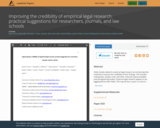
Fields closely related to empirical legal research are enhancing their methods to improve the credibility of their findings. This includes making data, analysis code, and other materials openly available, and preregistering studies. Empirical legal research appears to be lagging behind other fields. This may be due, in part, to a lack of meta-research and guidance on empirical legal studies. The authors seek to fill that gap by evaluating some indicators of credibility in empirical legal research, including a review of guidelines at legal journals. They then provide both general recommendations for researchers, and more specific recommendations aimed at three commonly used empirical legal methods: case law analysis, surveys, and qualitative studies. They end with suggestions for policies and incentive systems that may be implemented by journals and law schools.